Maintaining urinary tract health in cats is crucial, especially for those prone to urinary tract infections (UTIs) or urinary crystals.
The best cat food for urinary tract health should promote hydration, maintain an appropriate pH level in the urine, and reduce the risk of crystal formation.
Wet foods are generally better for urinary tract health as they increase hydration, diluting urine and reducing the risk of crystal formation.
See our list of the best foods to support urinary tract health below. But remember, always consult with your veterinarian before making dietary changes, especially if your cat has a history of urinary tract issues. They can provide personalized recommendations and monitor your cat's progress.
Please note: We normally only include foods within our Best Cat Food pages which are rated between 4 and 5 stars. However, you will see many of the recipes in this list receive a lower rating. This is because the criteria we use to rate foods does not always apply to recipes formulated for specific health conditions. Some ingredients would be considered controversial and marked down in foods for healthy cats, but are necessary in formulas that tackle certain issues/concerns. All the foods listed below are the best to help with urinary tract health.
Our top picks
- Hill's Prescription Diet c/d Multicare Stress Urinary Care (Dry) Jump to review
- Purina Pro Plan Urinary Tract Health (Wet) Jump to review
- IAMs Proactive Health Urinary Tract Health (Dry) Jump to review
- Royal Canin Urinary Care (Dry) Jump to review
- Forza10 Nutraceutic Active Urinary (Dry) Jump to review
- Farmina VetLife (Wet) Jump to review
-
Hill's Prescription Diet c/d Multicare Stress Urinary Care (Dry)
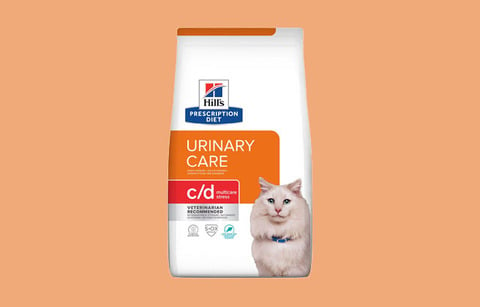
Hill’s Prescription Diet c/d Multicare Stress Urinary Care with Ocean Fish received the Cat Food Advisor’s second highest rating: 4 stars.
It is one of 22 recipes in a dry product range made by Hill’s Pet Nutrition, an international pet food brand that’s known for selling scientifically developed foods.
This particular recipe derives the bulk of its protein from ocean fish. Although the source is anonymous, fish meat is naturally rich in the 11 essential amino acids required by a cat to sustain life.
Dry matter label analysis reveals a wet recipe containing 34% protein, 17.1% fat and 42.1% carbohydrates . . . with a fat-to-protein ratio of 50%.
This product has been developed as a dietetic dry food with a special recipe to support normal urinary tract function. The mineral content is tailored to reduce the risk of new urinary stones forming. It also has urine-acidifying properties that can help to regulate the pH value of your cat’s urine.
Read our review of the full Hill’s Prescription Diet range.
Read our review of the full Hill’s Prescription Diet (Dry) range hereThings we like
- Therapeutic
- First ingredient listed as fish protein
- Fish oil provides omega-3
Main Ingredients Ocean fish, cracked pearled barley, whole grain oats, brewers rice, corn gluten meal. Texture Dry Type Kibble Protein Percentage 34% AAFCO Standards Maintenance Best For Adult Cats Save up to 35%
with Autoship
See discount in cartSample buyer review...
"Since Mac the Cat has started on Hill’s Prescription Diet he has had no urinary problems, which he suffered with as a kitten. We have a beautiful happy healthy cat"
-
Purina Pro Plan Urinary Tract Health (Wet)
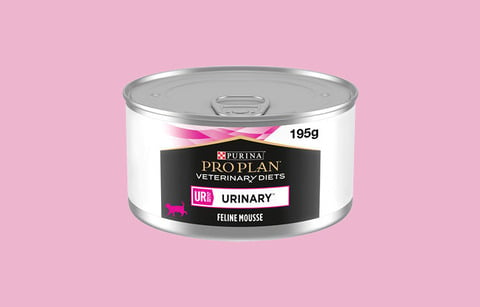
Purina Pro Plan Urinary Tract Health Formula Chicken Entree in Gravy received the Cat Food Advisor’s average rating: 2.5 stars.
It is one of 68 recipes in a wet product range made by Purina, tailored for specific health concerns.
Pro Plan Urinary Tract Health Formula Chicken Entree in Gravy derives the bulk of its protein from meat by-products. Dry matter label analysis reveals a wet recipe containing 54% protein, 15.9% fat and 21.5% carbohydrates . . . with a fat-to-protein ratio of 29%.
This specialized formula reduces urinary pH and provides low dietary magnesium to help maintain your cat’s urinary tract health.
Read our review of the full Purina Pro Plan range.
Read our review of the full Purina Pro Plan (Wet) range hereThings we like
- Provides excellent protein levels
- Contains good quality chicken protein
- Therapeutic
Main Ingredients Water, meat by-products, chicken, wheat gluten, corn starch-modified Texture Wet Type Meat in Gravy Protein Percentage 54.5% AAFCO Standards Maintenance Best For Adult Cats Save up to 35%
with Autoship
See discount in cartSample buyer review...
"The meat pieces are very small and there’s a good amount of sauce so she’s getting her fluids. Will buy again"
-
IAMs Proactive Health Urinary Tract Health (Dry)
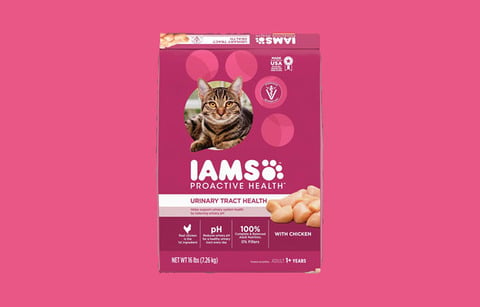
IAMs Proactive Health Urinary Tract Health with Chicken received the Cat Food Advisor’s average rating: 2.5 stars.
It is one of 13 recipes in this dry product range made by IAMs and has been formulated to help reduce the pH in cat urine to promote urinary tract health.
IAMs Proactive Health Urinary Tract Health with Chicken recipe derives the bulk of its protein from chicken and meat by-products. Dry matter label analysis reveals a wet recipe containing 35.6% protein, 16.7% fat and 39.8% carbohydrates . . . with a fat-to-protein ratio of 47%.
This food also includes vitamin E to maintain a healthy feline immune system, as well as essential nutrients, such as calcium and potassium, for a healthy heart.
Recommended.
Read our review of the full IAMS ProActive Health range.
Read our review of the full IAMS ProActive Health (Dry) range hereThings we like
- Chicken is listed as the first ingredient
- Therapeutic
- Includes fish oil for omega-3
Main Ingredients Chicken, chicken by-product meal, ground whole grain corn, corn grits, brewers rice. Texture Dry Type Kibble Protein Percentage 35.6% AAFCO Standards Maintenance Best For Adult Cats Save up to 35%
with Autoship
See discount in cartSample buyer review...
"We have been using IAMs Urinary Tract Health food for over 10 years now. Great quality cat food and my cats love it. Our cats have been free of urinary problems since we made the change. I will definitely continue buying the excellent product for our cats"
-
Royal Canin Urinary Care (Dry)
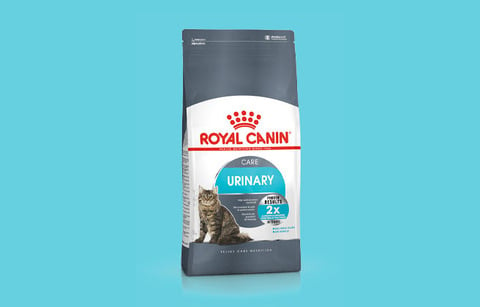
Royal Canin Urinary Care dry cat food received the Cat Food Advisor’s rating: 2 stars.
It is one of 15 recipes in this product range made by Royal Canin and is formulated to maintain healthy urine concentration by regulating the mineral balance and keeping the urinary pH levels low.
This Urinary Care dry food derives the bulk of its protein from chicken meal. Dry matter label analysis reveals a wet recipe containing 33.7% protein, 12% fat and 46.3% carbohydrates . . . with a fat-to-protein ratio of 35%.
This food has been scientifically designed to help prevent the formation of urinary stones.
Read our review of the full Royal Canin dry cat food range.
Read our review of the full Royal Canin (Dry) range hereThings we like
- Contains chicken fat
- Includes fish oil
- Added vitamins and minerals
Main Ingredients Corn, wheat gluten, chicken meal, brewers rice, corn gluten meal Texture Dry Type Kibble Protein Percentage 33.7% AAFCO Standards Maintenance Best For Adult/Senior Cats Save up to 35%
with Autoship
See discount in cartSample buyer review...
"One of my cats was adopted and fed dry food as a kitten. He still prefers dry food, and I chose this hoping to help protect his kidneys. Both cats love it"
-
Forza10 Nutraceutic Active Urinary (Dry)
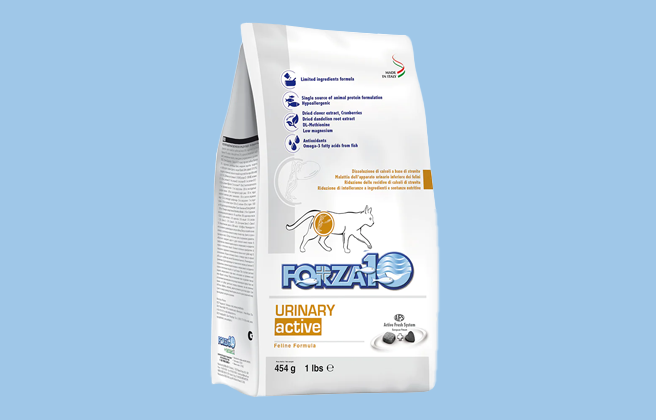
Forza10 Nutraceutic Active Urinary dry cat food received the Cat Food Advisor’s average rating: 3 stars.
It is one of six recipes in this product range made by Forza10, one of the first European pet food companies allowed to export products to the United States.
The Nutraceutic Active Urinary dry recipe derives the bulk of its protein from hydrolyzed fish protein. Dry matter label analysis reveals a wet recipe containing 30.4% protein, 16.8% fat and 44.7% carbohydrates . . . with a fat-to-protein ratio of 55%.
This food is designed to help support urinary health in cats by helping to stop idiopathic cystitis and the formation of struvite stones.
Read our review of the full Forza10 dry range.
Read our review of the full Forza10 (Dry) range hereThings we like
- Therapeutic food, scientifically researched
- Free from grain, wheat, corn and artificial preservatives
Main Ingredients Ground rice, hydrolyzed fish protein, vegetable oil, maize gluten, potato protein. Texture Dry Type Kibble Protein Percentage 30.4% AAFCO Standards Unspecified Best For Adult Cats Save up to 35%
with Autoship
See discount in cartSample buyer review...
"For crystal prone cats, this is a good option. Better nutrition than the prescription food, both cats like it"
-
Farmina VetLife (Wet)
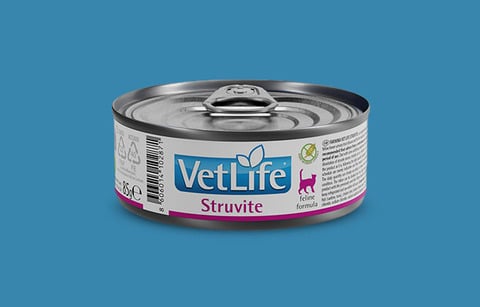
Farmina VetLife Struvite wet cat food received the Cat Food Advisor’s second highest rating: 4 stars.
It is one of four recipes in a product range made by Farmina. It is a complete dietetic food for cats formulated to help dissolve struvite stones, prevent feline lower urinary tract disease and reduce struvite stone recurrence.
This recipe derives the bulk of its protein from chicken. Dry matter label analysis reveals a wet recipe containing 40.8% protein, 22.8% fat and 28.4% carbohydrates . . . with a fat-to-protein ratio of 56%.
Farmina VetLife wet recipes are made with precise formulations to address specific medical issues and for this reason veterinary authorization is required to ensure your pet’s health is monitored whilst they are on the diet.
Read our review of the full Farmina VetLife wet range.
Read our review of the full Farmina VetLife (Wet) range hereThings we like
- Scientifically formulated
- Targets specific cat ailments
- High quality meat protein content
Main Ingredients Chicken fillet, sweet potato, hydrolysed fish protein, fish (sardine, tuna). Texture Wet Type Meat in Gravy Protein Percentage 40.8% AAFCO Standards Maintenance Best For Adult/Senior Cats Save up to 35%
with Autoship
See discount in cartSample buyer review...
"High quality cat food , the smell and look is similar to human grade . Very healthy , balanced meal. Nutritionally based for bladder health. My cats love it."
Best cat foods
What are the main causes of urinary tract infections in cats?
Urinary tract infections (UTIs) in cats can be caused by a variety of factors including the following:
- Bacteria Entering the Urinary Tract: The most common cause of UTIs in cats is the introduction of bacteria into the urinary tract, which can occur from the external environment or from the gastrointestinal tract.
- Common Bacteria: Escherichia coli (E. coli) is a common bacterial cause of UTIs.
- Feline Lower Urinary Tract Disease (FLUTD): This is a broad term encompassing various conditions affecting the bladder and urethra, such as cystitis, urolithiasis (bladder stones), and urethral obstruction.
- Bladder Stones or Crystals: The formation of crystals or stones in the bladder can irritate the urinary tract, making it more susceptible to infection.
- Diabetes Mellitus: Cats with diabetes are more prone to urinary infections due to changes in their immune system and high glucose levels in urine, which promote bacterial growth.
- Chronic Kidney Disease: This condition can lead to changes in urine concentration and pH, increasing the risk of infections.
- Low Water Intake: Insufficient hydration can lead to concentrated urine, which is more likely to cause irritation and provide a breeding ground for bacteria.
- High Magnesium and Phosphorus Levels: Diets high in these minerals can contribute to the formation of urinary crystals and stones.
- Stress: Stress can affect a cat’s immune system and bladder health, potentially leading to a condition called idiopathic cystitis, which can predispose them to secondary bacterial infections.
- Dirty Litter Boxes: A dirty litter box can harbor bacteria that can ascend into the urinary tract.
How do I know if my cat has a urinary tract infection?
Identifying a urinary tract infection (UTI) in cats can be challenging because cats often hide their discomfort. However, there are several signs and symptoms you can watch for:
- Frequent Urination: Your cat may make frequent trips to the litter box, often producing only small amounts of urine.
- Straining to Urinate: Straining or difficulty urinating, often accompanied by vocalization indicating pain.
- Blood in Urine (Hematuria): You might notice blood in the urine, which can appear as pink, red, or brownish.
- Urinating Outside the Litter Box: Cats with UTIs may urinate outside the litter box due to the urgency or discomfort they experience.
- Crying Out While Urinating: Vocalizing or crying out when urinating is a sign of pain or discomfort.
- Licking the Genital Area Excessively: Increased grooming of the genital area can indicate irritation or pain.
- Strong-Smelling Urine: A noticeable change in the odor of your cat’s urine might be a sign of infection.
- Changes in Behavior: Cats may become more irritable or withdrawn due to pain.
- Decreased Appetite and Lethargy: Loss of appetite and a general sense of lethargy can accompany the symptoms of a UTI.
How do vets diagnose a UTI in cats?
If you notice any of these symptoms, it’s essential to consult a veterinarian promptly. Your vet will typically perform the following to diagnose a UTI:
- Urinalysis: A sample of your cat’s urine will be analyzed to check for bacteria, blood, crystals, and other signs of infection.
- Urine Culture: This test identifies the specific type of bacteria causing the infection and helps determine the most effective antibiotic.
- Physical Examination: The vet will conduct a physical exam to check for signs of pain, bladder distension, or other abnormalities.
- Imaging: X-rays or ultrasounds may be used to check for bladder stones or other abnormalities in the urinary tract.
Other than changing diet, what other treatments are available for cats with a UTI?
Treating a cat with a urinary tract infection (UTI) involves several steps to ensure effective and thorough recovery.
Medications
- Antibiotics: The vet will prescribe antibiotics to eliminate the bacterial infection. It’s crucial to complete the entire course of antibiotics, even if your cat seems to improve before the medication is finished.
- Pain Relief: Pain management may be necessary to alleviate discomfort. The vet might prescribe anti-inflammatory medications or pain relievers.
Increased Hydration
- Encourage Drinking: Ensure your cat has access to fresh water at all times. Consider using water fountains, which many cats find more appealing.
- Broth: Adding low-sodium broth to your cat’s diet can encourage increased fluid intake.
Home Care and Monitoring
- Clean Litter Box: Keep the litter box clean to prevent bacterial growth and encourage your cat to use it regularly.
- Monitor Symptoms: Keep a close eye on your cat’s symptoms. If you notice persistent or worsening symptoms, contact your vet.
- Reduce Stress: Minimize stress in your cat’s environment. Provide a calm and stable home, regular playtime, and ensure your cat feels safe and comfortable.
How to prevent future UTIs in cats
- Regular Vet Check-Ups: Schedule regular veterinary check-ups to monitor your cat’s urinary health and catch any issues early.
- Consistent Diet: Maintain a balanced diet tailored for urinary health, as recommended by your vet.
- Encourage Hydration: Continue to encourage your cat to drink water. You can also provide wet food regularly to ensure adequate fluid intake.
- Healthy Weight: Keep your cat at a healthy weight, as obesity can contribute to urinary tract issues.
- Engagement: Provide toys, scratching posts, and interactive play to keep your cat mentally and physically stimulated, which can reduce stress.
Sources
Cat Food Advisor is reader supported. If you buy using links on this page, we may earn a referral fee.
Article reviewed by
Pet Nutritionist
Laura studied BSc (Hons) Animal Science with an accreditation in Nutrition at the University of Nottingham, before working for eight years in the pet food and nutrition industry.






